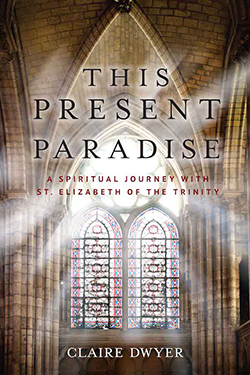Discovering heaven within: A review of “This Present Paradise” by Claire Dwyer

Reviewed by Lindsey Weishar
Claire Dwyer’s book, “This Present Paradise: A Spiritual Journey with St. Elizabeth of the Trinity,” is an invitation to meet a new (at least she was to me) saintly friend. In short chapters that blend her own life and experiences with St. Elizabeth of the Trinity’s, Dwyer shows how this cloistered Carmelite nun and contemporary of St. Therese of Lisieux has much to say to us in the 21st century. Each chapter also ends with a few questions for reflection based on themes in the chapter.
A few themes that weave themselves throughout the book are the gift of waiting and the fact that communion with God is not only possible, but an ever-present reality, no matter our vocation. Speaking of Elizabeth’s early desire to enter Carmel (which was impeded by her mother’s desire for Elizabeth to wait to enter until she turned 21), Dwyer reflects: “Waiting is a kind of suffering. I think this empty time is an early spring when life is pressing on the soil from below but cannot yet break out. It is a time to be available but not employed . . . It is necessary, and it is hard.”
But the beauty of Elizabeth’s waiting is the discovery she made within it. As Dwyer puts it in the introduction to the book: “in that place of waiting, God had reminded her that He is not confined to the convent. In a poem for Pentecost two years before she entered Carmel, Elizabeth wrote that her vocation was not ‘Carmel’ but ‘union.’ And this vocation can be lived anywhere.”
To illustrate this point, Dwyer shares later in the book a vivid moment from her own life, when, despite her desire to go to adoration, the needs of her family kept her at home. Of this moment she says,
Finally, that night, I knelt. Not in prayer. I knelt on the kitchen floor, head bent, cleaning up spilled Cheerios. And then, suddenly, this:
You couldn’t come to me, so I have come to you.
The words penetrated my heart. He was there. He was there, with me, among my mess in the dark kitchen. He saw. He knew.
UNION WITH GOD IS OUR END
Elizabeth’s particular call, it seems, is to teach us more about the Trinity, and about encountering God in our daily lives. In one of her letters, she speaks beautifully to the present paradise we are all called to live: “‘At every moment of the day and night, the three Divine Persons are living within you . . . You are never alone again.’” Dwyer meditates further: “She wanted us to understand that if union with God is our end, then heaven is not a destination, but rather a completion, a perfection of a state of being . . . We can live the life of heaven even now because ‘we possess our heaven within us.’”
When asked upon her death if her mission would be similar to St. Therese’s (who promised to “spend my heaven doing good on earth” and to “let fall from heaven a shower of roses”), Elizabeth said, “‘I think in heaven my mission will be to draw souls by helping them go out of themselves to cling to God by a wholly simple and loving movement, and to keep them in this great silence within that will allow God to communicate Himself to them and transform them into Himself.’”
Hers is a quiet, hidden mission, but one so dearly needed in our modern world, where distraction and noise can easily permeate.
COMPACT, BUT SPIRIT-PACKED
As I read, I was struck by how compact, yet rich and spirit-packed, each chapter of “This Present Paradise” is. In following Elizabeth through her early desire and eventual entrance into religious life, while also accompanying Dwyer through her vocation as a mother, I was encouraged by the beauty of a faith offers to each of us both an incredibly individual path and friends to accompany us through it, allowing our stories to intertwine. In intertwining her life with Elizabeth’s, Dwyer not only introduces us to this saint’s writings and thought, but to her very personhood. Elizabeth of the Trinity is certainly a friend who understands the desire to find God, and her life opens up a simple path of pursuing holiness: all we need to do is enter the “cell within [our] soul[s]” where we can “hide away with Him even in the midst of the world.”
This book is perfect for the reader who only has snatches of time — a handful of minutes between meetings, a few precious moments before the kids wake up in the morning, the wakeful hour in the middle of the night. Wherever we find ourselves in our spiritual and vocational journeys, Dwyer’s invitation is to welcome Elizabeth as our friend, to let her guide us within, where the Trinity awaits.
—
Lindsey Weishar is a poet, freelance writer, and member of St. Matthew Parish in Champaign. An assistant editor at The Young Catholic Woman, she has a master of fine arts in creative writing from the University of Missouri-Kansas City. Write to her at lweisharwriting@gmail.com.






